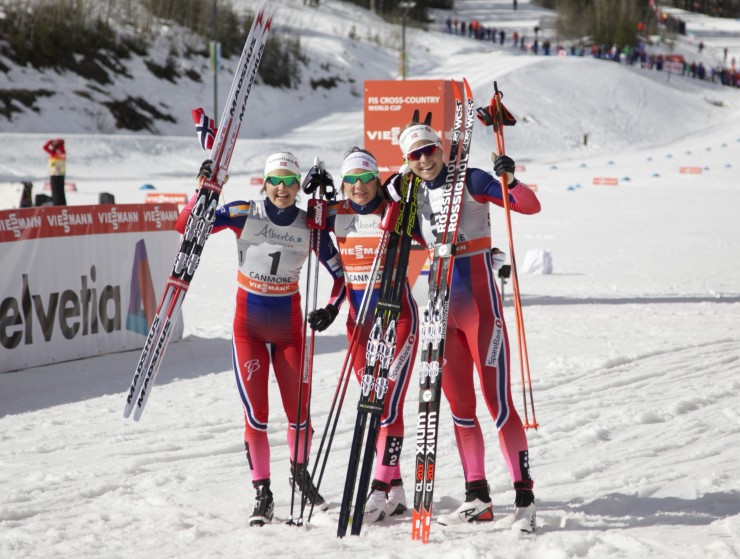
CANMORE, Alberta — The Canadian Rockies were an intimidating backdrop for the fifth stage of the Ski Tour Canada (STC) on Tuesday at the 1.5-kilometer classic sprint. The mountains surrounding Canmore rise and lift and simply dominate the valley. It’s as if nothing else matters. It’s hard to look away.
Like those mountains, Norway’s Maiken Caspersen Falla commanded the World Cup sprint show. Coming down the homestretch during the finals, you couldn’t ignore her. She won the final in 4:09.26 minutes to earn the win and honor of standing atop two podiums — after the race, she was awarded the Sprint Crystal Globe, which she had secured earlier during the STC’s Stage 3 freestyle sprint.
Joining Falla on Tuesday’s sprint podium were two of her teammates, after Astrid Uhrenholdt Jacobsen has placed second, 7.07 seconds behind her, and Ingvild Flugstad Østberg took third (+8.66).
Finland captured fourth and fifth with Krista Parmakoski (+18.03) and Anne Kyllönen (+19.07), respectively. U.S. Ski Team (USST) member Jessie Diggins placed sixth, 21.96 seconds behind Falla, for her first final and best result in a World Cup classic sprint.
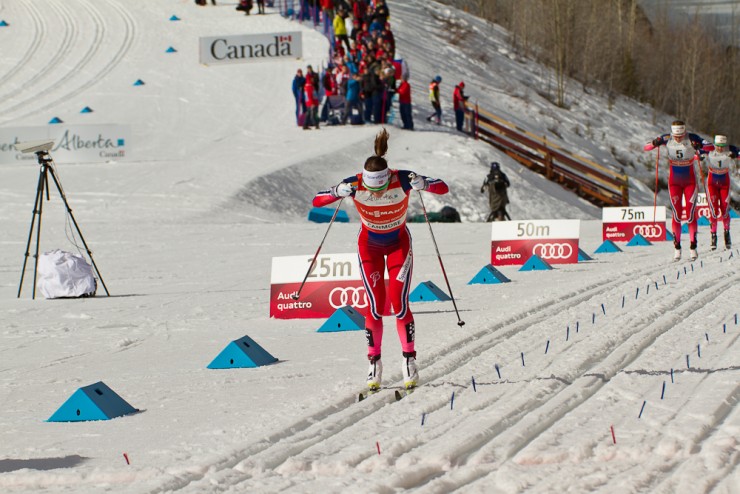
Norway’s Maiken Caspersen Falla powers down the homestretch to win Tuesday’s classic sprint final by 7 seconds over teammate Astrid Uhrenholdt Jacobsen (behind) at Stage 5 of the Ski Tour Canada in Canmore, Alberta.
The time gaps were huge and were a quantifiable way of defining what the Canmore crowds witnessed in the final: an uncontested Falla 20 to 30 meters ahead of her closest competitors as she raised her hands across the line.
The win capped an astonishing streak. Falla is undefeated in classic sprints since she began with a win last March in Drammen, Norway. Sophie Caldwell of the U.S. Ski Team (USST) won the classic sprint during this year’s Tour de Ski, but Falla did not start that day.
In the post-race press conference, Falla spoke of how she comes for one thing: the win.
“When I am starting a ski race I am always wanting to win,” she said. “My shape is so good, and I know I have the possibilities to stand on top of the podium. You never know when you get the possibility again. When your shape is so good you just have to enjoy it and do the best you can.”
Her best was the best in the end. But in the morning qualifier, Østberg, who will finish second-overall in the Sprint World Cup standings, qualified first, nearly a full five seconds ahead of Falla, the second qualifier.
Østberg seemed to be on cruise control until the final. She won the first quarterfinal by almost 2 seconds and the first semifinal by half a second. If the old fable about the tortoise and the hare has anything to do with World Cup sprinting, then Østberg was the hare.
In the final she faded and faded in Falla’s wake. Remember those big time gaps — 7.07 and 8.66 seconds back to second and third.
“It was a tough final a tough sprint today,” Falla said at the press conference. “It was a long course and we had to fight to the end. The three of us [Falla, Østberg and Jacobsen] got some meters and Maiken got some meters on me. On the last uphill we had to fight all the way to the finish. It was so hard I didn’t have any power left at the end. It was a great day for Norway and we had great skis. I’m in good shape and had great skis. It was a great day here in Canmore.”
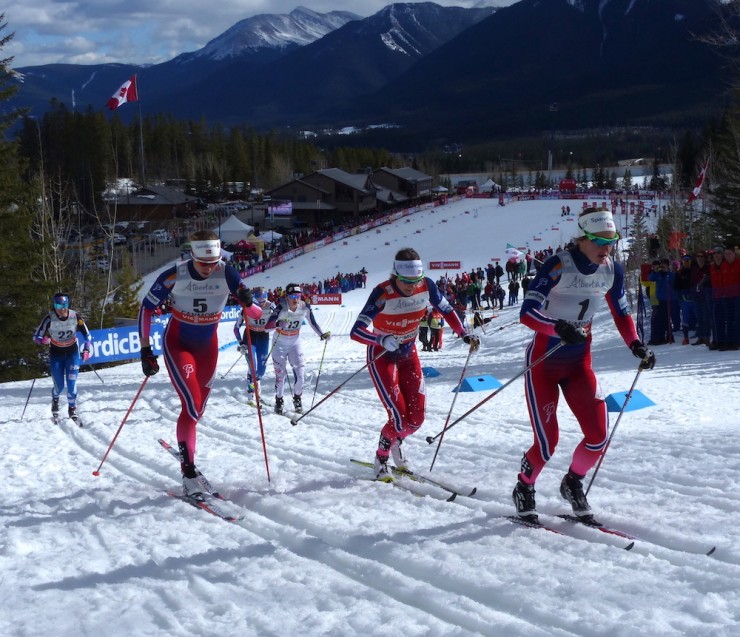
Runner-up Jacobsen mentioned a dicey sweeping righthand corner racers had to navigate at top speed. She addressed the corner because she remains in third overall in the STC’s standings. Norwegian Heidi Weng still holds the Tour lead in 1:04.04.5, with teammate Therese Johaug just 3.1 seconds behind in second overall. Both Johaug and Weng fell separately on that corner in their quarterfinals and placed 16th and 17th, respectively, on the day.
“Before the quarterfinals they put some salt out on the curb,” Jacobsen said. “I was a bit prepared for going in and out of the salt, when I came out of the salted area there was a lot of snow and I think that’s what took [Johaug and Weng] out, and also a lot of the guys. It was a difficult curb.
“I was really bummed they fell,” she added. “It’s always more fun to ski more fairly against each other. I think Therese and Heidi will be not really tired tomorrow. So maybe they will run out the same tomorrow and not look back. You have to ask tomorrow maybe it was a good thing that they fell for them.”
Diggins Can Stride
Diggins posted the best North American result and a career best in a classic sprint. Qualifying in 13th, 14.58 seconds behind Østberg’s winning time of 3:41.61, Diggins charged to a quarterfinal win in the first heat of the day. She placed fourth in the first semifinal, the fastest of the two semifinals by five seconds. Diggins moved into the finals as a lucky loser.
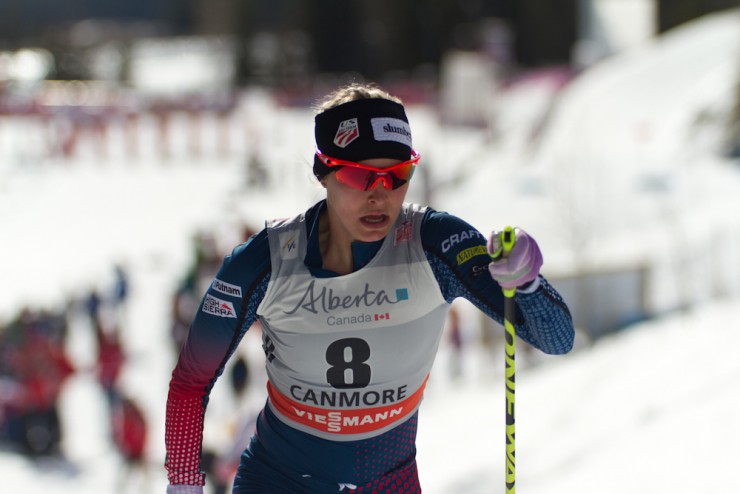
But luck has nothing to do with her consistency this season.
“I went into the season with my one of my big goals was to qualify in a classic sprint because until this year I had never done it,” Diggins said in an in-person interview afterward. “So getting to be in a final, it was like, ‘What?’ ”
Diggins praised the wax techs for her slick skis on what was undoubtedly a tricky day. Think sun, then clouds, and some flurrying. Firm tracks in the morning deteriorated, melted, and in places became non-existent as the snow broke down.
“It was obviously a very tricky day, it started snowing at one point, what do you do in that situation? But I think they handled it really well and did a great job and I was really impressed with the service team,” Diggins said.
Asked if she was nervous before the final, she remarked she simply felt good.
“Mostly just happy because in a tour, to make the final is really important because of the bonus time,” Diggins said. “I was like, going into today if there is anyway I can make the semis that would be great because the closest I could get to the front, the better the time. Getting to make the final I was like, ‘Yes.’ ”
Diggins was a fan favorite in Canmore.
“It was so cool that whole hill was chanting my name,” she recalled. “They were like ‘Jessie!’ ‘Jessie!’ I wish I was skiing faster because they are so psyched. I just got really tired at the end.”
For Diggins moving forward, it’s all sixes. Entering Wednesday’s sixth stage, the 15 k skiathlon, she ranks sixth overall, 1:39.8 minutes behind Weng.
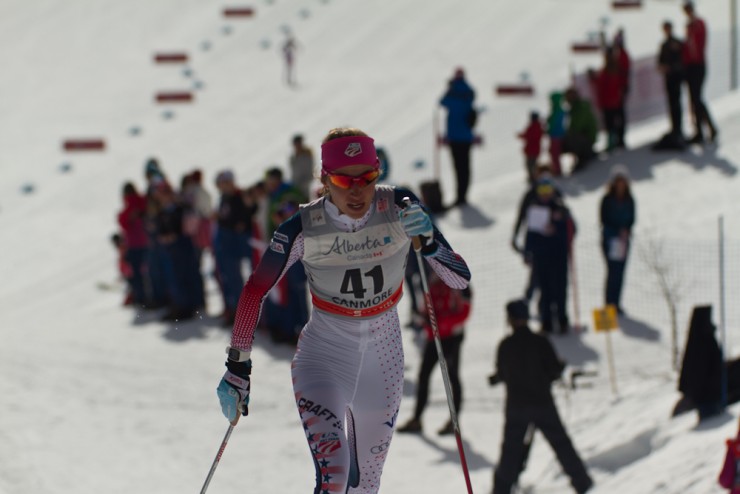
Sophie Caldwell (USST) placed 11th overall in Tuesday’s STC Stage 5 classic sprint in Canmore Alberta.
Caldwell ended up 11th in the sprint after qualifying in ninth (+12.42). Despite fighting a cold, Caldwell reached the semifinals as a lucky loser, but was eliminated in the first semifinal, finishing sixth behind Diggins.
“I’ve been sick since the [Quebec] sprint day,” Cadwell told FasterSkier. “I was starting to feel like it was starting to go away and then when we traveled it went to my head. I am definitely feeling better today than yesterday.”
With a small cough and some congestion, Cadwell is still undecided if she’ll continue the STC.
“I haven’t made that call yet. I think who knows, it is a lot easier for me to feel good for a sprint than it is for a distance race. It could be a stretch to try to keep racing. But we will see,” she said. “Best-case scenario, I raced it out of me and I should try again, but that might be wishful thinking.”
Cadlwell mentioned she has never finished the Tour de Ski. “That’s a noble pursuit going into the [STC] … You have to be on top of everything, recovery, refueling, etc. That takes a while to learn,” she said.
A day after her 22nd birthday, Canadian U23 Development Team member Dahria Beatty had a breakout performance. Tuesday marked Beatty’s 13 World Cup start. Of those 13 races, six have been sprints, Beatty has never qualified. That changed in Canmore. The Whitehorse native created her own fate by qualifying 29th (+18.95).
Seated in the fourth quarterfinal, which was won by Jacobsen, Beatty said she was encouraged to head up to the front.
“It was awesome, I have never started so fast in my life,” Beatty recalled. “I didn’t know what happened. I had a lot of energy and coaches were saying, ‘Race and don’t be afraid to go to the front.’ So I found myself at the front in the beginning and then the climb.”
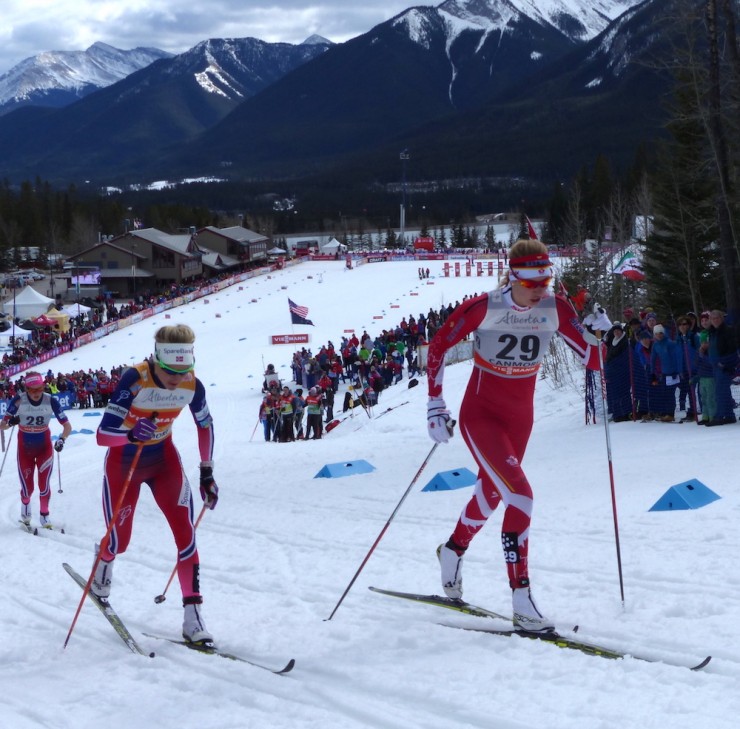
Beatty was in the quarterfinal where Johaug fell. And when the Norwegian crashed and subsequently hammered to make contact once she righted herself, it motivated Beatty. “I just kept pushing hard and Johaug took a tumble so she was able to pull me back to contact a little bit. My skis were running really well.”
With good form and good skis, Beatty fed off the crowd and knowledge of Canmore’s trails.
“I pushed really hard and missed out on the lucky loser position by I think 0.3 of a second,” Beatty said. “It was by far my best result ever … My best result at World Juniors is [15th] so to have that on the senior World Cup level is amazing.”
The result was a confidence booster.
“I’ve not had so much experience yet. You always feel a little bit like maybe I’m not quite good enough to be here,” Beatty said. “But having a day like this makes me go, even if some days aren’t that great. There is something in there that I can be able to compete at this level and that’s nice to know.”
“I didn’t know what happened. I had a lot of energy and coaches were saying, ‘Race and don’t be afraid to go to the front.’ So I found myself at the front in the beginning and then the climb.” — Dahria Beatty, 22, after placing 15th in Tuesday’s classic sprint for her first World Cup top 30
American Sadie Bjornsen raced to 18th. Already establishing herself as an elite racer among the World Cup ranks, she too, like Diggins, has a top-10 overall rank heading into Wednesday’s skiathlon. Ninth overall in the Tour, Bjornsen said her day played out with the good and the bad.
“I felt really good in the warmup and the qualifier was a little interesting,” Bjornsen said. “It just didn’t feel like my greatest. And the heats, it was like everything went pretty well and the finish coming down the hill I just lost a bit.”
As the STC moves onto its last three stages, Bjornsen is talking like a seasoned veteran; matured, centered, and able to navigate the highs and lows.
“The Tour de Ski, you just have to keep your head down and roll through disappointment just right through to the next day,” Bjornsen explained. “If you are excited you try to not get too excited, but use it towards having some confidence in the next race … In Canmore with such hard courses, and the high altitude … I’ve been just telling everyone I’m getting ready for the war.”
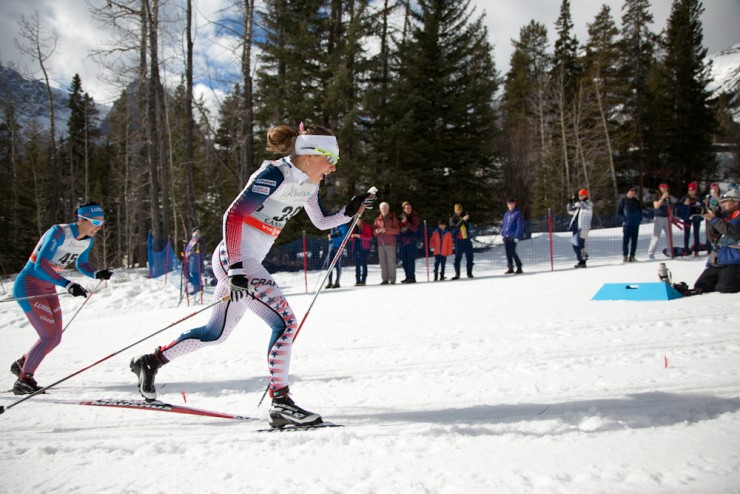
The fourth American and USST member to qualify for the heats was Ida Sargent, who posted the 18th fastest qualifying time (+15.51). Sargent ended up 22nd on the day after finishing fifth in the first quarterfinal. Asked about her race, Sargent deadpanned, “It felt like a sprint.”
She also was able to articulate what the day was like for most athletes: a relentless course, slow conditions, and the unwavering altitude.
“It was just a tough day out there,” Sargent said. “The conditions were really slow this afternoon and there wasn’t really any recovery. It was just tough.”
Also for North America, Americans Annie Hart (Stratton Mountain School T2 Team) and Kaitlynn Miller (Craftsbury Green Racing Project) finished in 36th and 38th respectively. They were followed by Rosie Brennan (USA) in 41st, Olivia Bouffard-Nesbit (CAN) 42nd, Emily Nishikawa (CAN) 44th, Katherine Stewart-Jones (CAN) 46th, Caitlin Gregg (USA) 47th, Cendrine Browne (CAN) 50th, Jennie Bender (USA) 51st, Jenn Jackson (CAN) 52nd, Maya MacIsaac-Jones (CAN) 53rd, Katharine Ogden (USA) 54th, Sophie Carrier-Laforte (CAN) 56th, Chelsea Holmes (USA) 57th, Annika Hicks (CAN) 59th, Alannah Maclean (CAN) 60th, and Liz Stephen (USA) 61st.
Racing continues Wednesday with the sixth stage of the Tour, the women’s 15 k skiathlon and men’s 30 k skiathlon.
— Gabby Naranja and Gerry Furseth contributed reporting
Qualifier | Heats | Tour standings (through Stage 5)
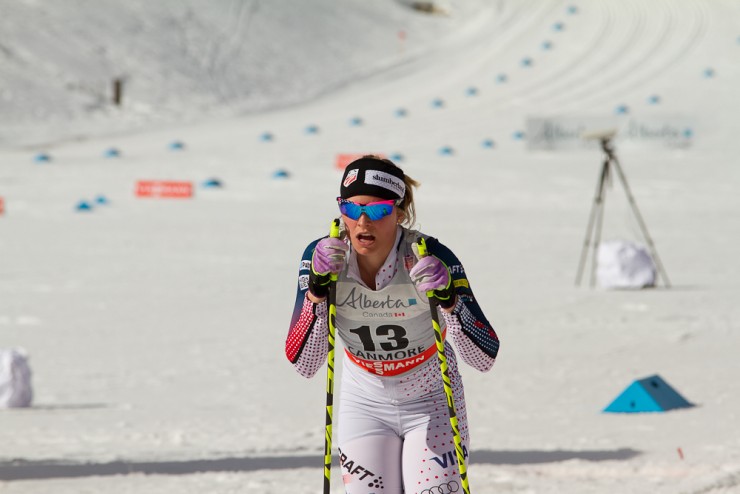
Jason Albert
Jason lives in Bend, Ore., and can often be seen chasing his two boys around town. He’s a self-proclaimed audio geek. That all started back in the early 1990s when he convinced a naive public radio editor he should report a story from Alaska’s, Ruth Gorge. Now, Jason’s common companion is his field-recording gear.



